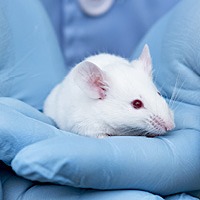One of the barriers to translating research results from pre-clinical to clinical is when positive results seen in animal models fail to be apparent in humans. Many early-stage studies use a single mouse strain. These mice are genetically homogeneous, and while this makes the results easier to interpret, it also means the results may be specific to that genetic background. When the same treatment is applied to a genetically heterogeneous human population, one often observes a heterogeneous response.
In a study with collaborators from Virginia Tech, BYU, and our next-door neighbor, the NCSU Plants for Human Health Institute, NRI professor Susan Smith, PhD, looked at the effect of a single flavonoid, quercetin, on dietary high fat-induced obesity (quercetin is a colored pigment found in many fruits and vegetables). Unique to this study was the use of six different strains of mice (male and female). Notably the amount of weight gained while on the high fat diet differed substantially by strain and by sex, with some strains more than doubling their weight while others increased by less than 10%. Quercetin reduced weight gain in several, but not all cases. Addition of antibiotics, to alter the gut microbiome, also had sex- and strain-specific effects. Differential strain and sex effects were also observed with respect to fasting blood glucose and insulin levels. Weight, blood glucose, and insulin level also exhibited different correlations among strains.
This study tested the effect of a single nutrient, quercetin, on few endpoints (weight, glucose, insulin) in six mouse strains. The findings of substantial variability in responses encapsulates the foundational principle of precision nutrition: different people respond differently to certain nutrients. This study further highlights both the importance and the challenges of accounting for the diversity of genetic backgrounds when assessing the effectiveness of drugs and nutritional products.
Griffin LE, Essenmacher L, Racine KC, Iglesias-Carres L, Tessem JS, Smith SM, Neilson AP (2021). “Diet-induced obesity in genetically diverse collaborative cross mouse founder strains reveals diverse phenotype response and amelioration by quercetin treatment in 129S1/SvImJ, PWK/EiJ, CAST/PhJ, and WSB/EiJ mice.” J Nutr Biochem, 87:108521.
PubMed: https://pubmed.ncbi.nlm.nih.gov/33039581/

